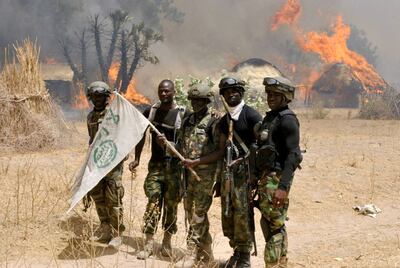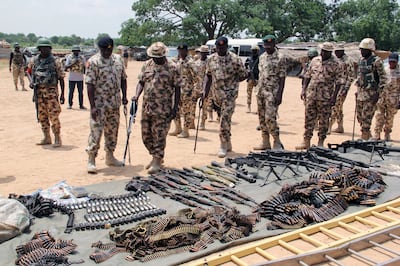Boko Haram’s leaders took direct inspiration from the Muslim Brotherhood and Al Qaeda, according to a landmark Tony Blair Institute report on stopping extremism.
The report, Violent Extremism in Sub-Saharan Africa: Lessons from the Rise of Boko Haram calls for action to tackle the ideology spread by Islamist extremists if terror groups such as those on the rise in Africa are to be defeated.
The report’s author, Bulama Bukarti, a counter-terrorism analyst at the TBI, told The National it would be a “mistake” to think Boko Haram is just a branch of ISIS or Al Qaeda and that if they are defeated Boko Haram will wither and perish.
He said the ideology of extremism needs to be tackled as well as the networks that Boko Haram controls on the ground.

In a plea for policies that address the root causes, he said that countering the ideas and worldview of extremists was paramount. “To do that we must be meticulous in working with Muslim religious groups and communities and the governance by investing in the economy, infrastructure and education," he said.
“We cannot defeat Boko Haram or any group in Africa until we address the underlying causes of ideology and social and economic grievances.”
Going back to Boko Haram's origins for lessons in the rise of the Nigerian insurgency, he said sections of the group were inspired by the September 11 attacks, Osama bin Laden and the Muslim Brotherhood.

One of its leaders, Muhammed Yusuf, was a member of the Muslim Brotherhood’s Nigerian branch and left it to create Boko Haram. The Boko Haram manifesto contains the brotherhood's ideology and its leaders citied the works of Sayyid Qutb.
“Although they never gained first-hand experience in the Middle East, Boko Haram’s leaders took direct inspiration from [these] groups in the region,” Mr Bukarti said.
As Boko Haram’s founders were inspired by ideologues, they often plagiarising or mimicking the literature of Islamist extremist groups and adopting identical operational strategies to shape their own movement.
Mr Bukarti said that over the past 12 years Boko Haram has grown into one of the most influential and dominant terrorist groups in the world.
“Though the group has gained notoriety for its violence and mass kidnappings in Nigeria’s north-east, Boko Haram is today a transnational threat that has sustained an insurgency despite both regional and international military counterterrorism efforts," he said.
“While international actors have long been driven by the view that Boko Haram and its constituent factions would be weakened by the defeat of ISIS, this has not come to pass and efforts to defeat the group have fallen short. In fact, the ISIS-allied faction of Boko Haram became stronger after the territorial defeat of the Islamic State in Iraq and Syria in 2019.”
The report contains interviews with former classmates and students of Boko Haram founders, and sets out issues for counter-terrorism experts to address. Mr Bukarti sets out to demolish widely believed myths such as that founder Muhammed Ali personally met Bin Laden.
“Our original evidence shows that Ali never met Bin Laden or fought in Afghanistan,” he said.

“Instead, they all studied, got radicalised and trained locally. Arabic-language literature from the Middle East played a big role both in their radicalisation journey and in their recruiting and mobilising of other fighters.”
The report found that low literacy rates and education gaps have served as tools and opportunities for recruitment.
“Boko Haram became adept at attracting and manipulating followers from low socioeconomic backgrounds, many of whom lacked a solid education,” Mr Bukarti said.
“Governments should prioritise soft-power policy programmes that aim to equip communities with the basic skills to dispute and counter extremist narratives. While it is difficult to overhaul entire education systems and improve access rates in underdeveloped areas such as Borno and Yobe, more work could be done to equip individuals with the basic skills to consciously disrupt Boko Haram narratives.
“This could be in the form of existing development programmes run by organisations such as the Foreign, Commonwealth & Development Office, which educates communities in Africa who are vulnerable and hard to reach.”
The report said Boko Haram and its network embedded themselves in social, religious and political channels at a local level. It recommends monitoring local Islamic networks and emerging religious leaders.
“One specific tool worth considering would be the reintroduction of a pre-1979 local council arrangement giving emirs, chiefs and other traditional Muslim rulers a formal role in administrative, security and religious matters, specifically in assisting with the maintenance of law and order,” Mr Bukarti said.
“By establishing this type of close relationship with traditional authority figures and people at the grass roots, such an arrangement would act as a warning system for any potential extremist movement such as Boko Haram emerging at the local level.”
He is also calling for the Financial Action Task Forces operating across the Lake Chad Basin to be educated on the particular local dynamics of terrorist financing and says all governments directly affected by Boko Haram activities need to do more to synchronise their military, deradicalisation and prevention programmes.







